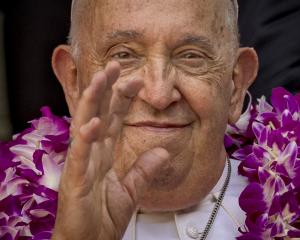
Just what is in that air we are breathing?
I am sure that Fran Hammond (Letters ODT 11.12.24) is not the only one who is steaming about cruise ship smoke. Nor should she be.
Cruise ships produce harmful emissions that impact climate, air quality and human health.
Over time cruise ships have become larger to cater for mass markets. Large cruise ships require a lot of power and produce many pollutants.
A lot of exhaust is emitted in harbours because manoeuvring procedures produce increased emissions and air pollution. Then engines keep running while in port to power onboard amenities, facilities and services. So what is in that "plume of filthy smoke"?
Research in Europe has shown that cruise exhaust contains air pollutants including sulphur oxides (SOX), nitrogen oxides (NOX) and particulate matter (PM). In 2022 a total of 218 cruise ships operated in Europe emitting SOX equivalent to 1 billion cars — four times more SOX than all of Europe’s 253 million cars.
Perhaps the greatest concern is that air pollution damages people’s health.
Something to ponder next time you see a cruise ship making its way up the harbour.
Possible solution
Having read letters and columns on both sides of the debate regarding the government's decision to exclude the humanities and social sciences from the Marsden Fund, I propose a solution that would please both supporters and opponents.
Perhaps establishing a separate humanities and social science fund along the lines of the National Endowment for the Humanities in the United States would be a good idea. This fund could be jointly funded by the government, universities and the private sector. That would allow humanities and social science scholars to access funding for their research while allowing the Marsden Fund to focus on the STEM disciplines.
As a history and politics graduate, I think that the humanities and social science contribute to the pool of human knowledge as well as social, cultural and economic development. They can help us develop critical thinking, writing and oratory skills while understanding how the past shapes the world that we live in.
Sometimes this research can raise difficult questions about how society operates. I understand there is concern in the West that some humanities and social science research has contributed to division and identity politics. However let's not throw the baby out with the water.
The humanities and social science fund could be named after notable New Zealand scholars such as the historians Michael King and Keith Sinclair, the lawyer and politician Apirana Ngata and anthropologist Peter Buck.
No contest
What made the Otago Regional Council decide they needed a large state-of-the-art building to work in? How can that be justified when we are still fighting for a hospital.
The hospital benefits everyone in Otago; the ORC building will be a nice place for them to work in. No contest
Hospital ‘fast-track'
Wonderful ideas from John Drummond (ODT, 11.12.24 ) that Nicola Willis could pass on to Christopher Luxon.
He would be so impressed with this budget cut wizardry!
The way things are shaping up it would appear that John Drummond's predictions as to how the future Dunedin hospital is going to meet the government's budget expectations are highly likely, the only incorrect one being that the birthing unit will be in the carpark.
This is unlikely as there will be no car parking. Can I therefore suggest the cycle lanes as an alternative location?
Treaty Bill
David Seymour is right. Who could mount a challenge to any of the proposals in his Bill ?
However there is a caveat: the measure of a democracy is how it treats its minorities.
Address Letters to the Editor to: Otago Daily Times, PO Box 517, 52-56 Lower Stuart St, Dunedin. Email: editor@odt.co.nz











